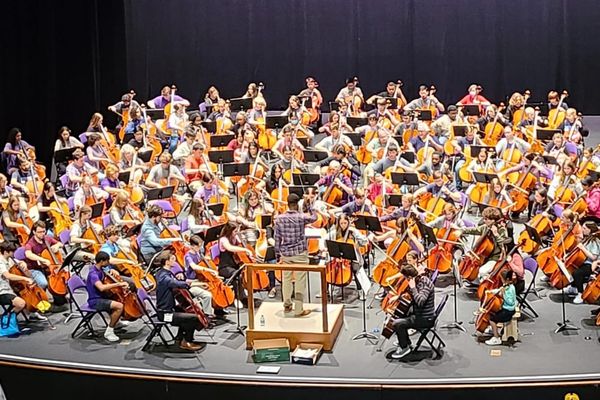On Sept. 15 and 16, the annual CELLObration event made its return to provide a weekend of entertainment to the Furman community.
The event was split into two separate concerts–the faculty recital was held at Daniel Recital Hall at 8 p.m., and the cello choir concert at 5:30 p.m. Furman’s cello professor, Dr. Christopher Hutton, hosted the event and performed in the faculty recital alongside three guest cellists: Mr. Robert O’Brien, Dr. Seth Russell, and Dr. Khari Joyner. Joyner and Russell conducted the cello choir, which consisted of as many as 130 cellos.
Hutton said there were so many cellists that “when they tried to put enough chairs and stands on the stage, they couldn’t fit [them] without taking out the sound shell.”
O’Brien is both a cello instructor at the South Carolina Governor's School for the Arts and Humanities and a principal cellist of the Greenville Symphony Orchestra. He kickstarted the faculty recital with his solo of Bach’s “Suite in G major, BWV 1007.” In providing background on the piece, he shared that it was considered such a remarkable unaccompanied cello suite that no composer after Bach tried to write for unaccompanied cello for around 200 years.
He believed this was because the succeeding composers were “too intimidated by how great the Bach suites are.”
Hutton followed O’Brien’s solo with two pieces: Adolphus Hailstork’s “Variations on “‘Draw the Sacred Circle Closer’” and Benjamin Boone’s “Buffing the Gut.” The first piece periodically shifted between a slow, serene tone and a swift, intense waltz-like tone. “Buffing the Gut,” though, was a most impressive piece. Akin to music one would hear in an action scene of a spy film, Hutton uses one instrument to execute—with ease—a piece that would usually involve an orchestra to perform. After its conclusion, Hutton was met with large applause.
Russell, also a principal cellist of the Greenville Symphony Orchestra, then took to the stage and performed Edmund Finnis’ “Preludes,” a 10 minute, five-prelude piece that he called a “minimalistic take on a suite.” Each of the five preludes held different melodies and moods which ranged from reflective to urgent to quiet tragedy. It told a story of facing and overcoming hard trials and heartbreak before finally meeting a peaceful resolution.
Taking up the final solo performance was Khari Joyner, an Assistant Professor of Cello from Baldwin Wallace Conservatory in Ohio. His first piece, “Abraham’s Sons” by James Lee III, was written as a response to the 2013 death of Trayvon Martin and the Black Lives Matter movement that followed. The piece melodically communicated the grief and outrage sparked by a life being cut short by an act of hate.
Joyner performed his next piece, “Intransigence,” which he created after he was inspired by artists he encountered at a France music festival, as he explained before his performance. He also expressed that both songs are in their own ways contemplative, drawing on sounds of nature and reflecting on human life.
The recital concluded with all four cellists performing together. They provided the orchestra bit of Jon Grier’s “Step it Up.” Their performance of Dick Dale and the Del-Tones’ “Miserlou,” known for its feature in the 1994 film “Pulp Fiction,” was another highlight. As the song progressed and reached its intense climax, they gradually joined together and played with passionate strums of their bows in unison. This final performance garnered much applause as well.
The cello choir concert the night after was split into two choir sections: the advanced cello choir for the first half of the concert, and the large cello choir for the second half. Both cello choirs were conducted by Joyner. The advanced cello choir began its portion with a rendition of Scott Joplin’s famous piece “The Entertainer.” Another highlight was their performance of Thompson’s ethereal “Alleluia,” which Joyner expressed was one of the first cello choir pieces he heard as a child.
A large cello choir gathered on stage before the last half of the concert, making up the 130-orchestra body. They resumed their performance with the beginning of Richard Strauss’ “Also Sprach Zarathustra,” well-known for its feature in the 1968 film “2001: A Space Odyssey.” Other notable pieces they played include Gabriel Marie’s “La Cinquantaine,” Jacques Offenbach’s “Orpheus in the Underworld,” and a rendition of Lennon-McCartney’s song “Eleanor Rigby.”
For two evenings, cellists showed families, students, and Furman community members the fascination of cello music. They impressed audiences with the challenging compositions solo cellists can execute, as well as the charming pieces cellists can perform when brought together. Moreover, the CELLObration event portrayed music’s power to unite people, both on the stage and in rows of auditorium seats who basked in a shared appreciation for music.
Full-streamed videos of both concerts can be found on Furman University Music’s YouTube.
